Inventions
The Beautiful Beauty Mask
Patented in 1954 by Ann S.V. Mann of Petersburg, Virginia.It functioned like any other beauty mask. Its primary difference, claimed Mann, was that her mask had the outer appearance of a "strikingly beautiful woman":
The exterior surface of the plastic film body 5 is painted or otherwise decorated to create eyebrows, lashes, nose and mouth lines, etc., so designed as to give the facial appearance of a strikingly beautiful woman. This artistic treatment is an important feature of the invention. Beauty is accentuated in every way possible in all phases of the invention.
Due to the uncanny valley effect, she may actually have ended up creating something that looked more grotesque than a regular mask.
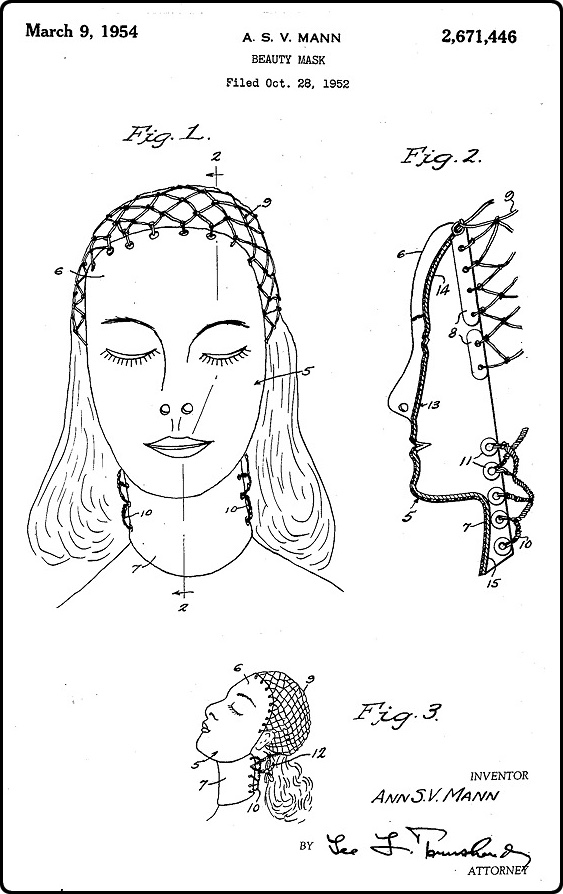
Posted By: Alex - Sun Jan 19, 2020 -
Comments (2)
Category: Beauty, Ugliness and Other Aesthetic Issues, Inventions, Patents, 1950s
Harmless Hunter
In 2012, the brothers Randy and Michael Gregg tried to raise money to produce their 'harmless hunter' or 'kill shot' gun. Though it wasn't actually a gun. It was a camera shaped like a gun. From their Kickstarter page:They never succeeded in raising enough money. Apparently the idea appealed neither to hunters nor to wildlife photographers.

Posted By: Alex - Fri Jan 17, 2020 -
Comments (1)
Category: Guns, Inventions, Photography and Photographers
Cow burgers and hot dogs
In 1950, Rodney Graves of Arizona patented cow-shaped burger patties. However, he missed an opportunity by not also patenting a cow-shaped bun.
Edward Kiwala of Chicago didn't make a similar mistake when, in 1969, he patented a dog-shaped hot dog (or, at least, a hot dog with four legs like a dog). He also patented the accompanying bun.

Posted By: Alex - Sat Jan 11, 2020 -
Comments (2)
Category: Food, Inventions, Patents
Immersion in sprinkles
Just a few days ago, on Dec 24, 2019, Maryellis Bunn of New York, NY received patent no. 10,513,862 B2 for a “system, method, and apparatus for simulating immersion in a confection.” The specific confection she had in mind was candy sprinkles. Although the patent extends to include Hershey’s kisses and popcorn.In other words, what she’s patented is the idea of a pool full of fake sprinkles, which people can immerse themselves in.


This makes more sense once you find out that Bunn is the founder of the Museum of Ice Cream, and apparently one of the activities you can do, if you visit her museum (in either New York or San Francisco), is swim in a pool of fake sprinkles. See the video below.
Bunn's Museum of Ice Cream business is reportedly worth around $200 million, and she only started it in 2016. So, while some are mocking her sprinkle-immersion patent as frivolous, she's laughing all the way to the bank.
Posted By: Alex - Wed Jan 08, 2020 -
Comments (3)
Category: Business, Inventions, Patents, Candy
The Man Can
Its formal name was the “man-carried auto-navigation device,” but it went by the nickname “Man Can.” The Martin-Marietta Corporation received patent no. 3,355,942 for it in 1967.It was a device designed to help soldiers avoid getting lost. The patent offered this description:

It combined a compass and a pedometer. A GI would record his initial location on a map, and then the device would track his footsteps and the directions in which he turned. When he was done walking, the device would tell him his new coordinates.
A key feature of the device was that it didn't use any battery power. So the GIs would never need to worry about it running out of juice. It operated via a bellows located in the heel of the GI's shoe.
I can't find any follow-up reports about how well this gadget worked. Apparently not well enough to warrant its adoption by the army. But it was an interesting concept.

Allentown Morning Call - Dec 11, 1967
Posted By: Alex - Sun Jan 05, 2020 -
Comments (4)
Category: Geography and Maps, Inventions, Patents, Military, Technology, 1960s
The Taste Organ
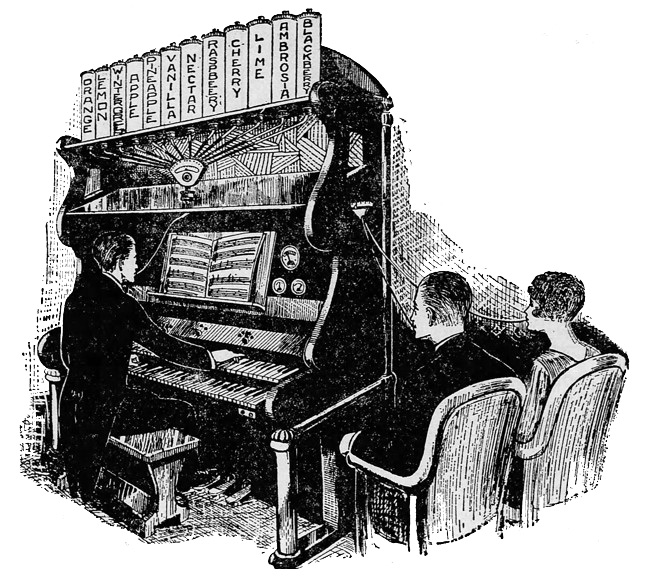
Decatur Herald - Sep 14, 1926
Posted By: Alex - Thu Jan 02, 2020 -
Comments (0)
Category: Food, Inventions, 1920s
Shaving with X-rays
It wasn't long after the discovery of x-rays, that people realized they could be used to remove body hair. In 1899, the American X-Ray Journal noted the "epilating properties of the X-Rays," and suggested that hair removal might be a profitable side-business for x-ray technicians.However, as far as I can tell, it wasn't until 1945 that anyone got around to patenting the idea of x-ray hair removal. The patent was granted to Violet Arnold of Detroit. Columnist Frederick Othman wrote about it in a Dec 1945 column:
Miss Arnold's shave consists of two X-ray treatments of five to ten minutes each with the rays going through an aluminum plate before they hit the whiskers. That makes 'em curl up. Then she attacks the wilted whiskers nine more times in five weeks with rays going through aluminum and a bottle of water, too.
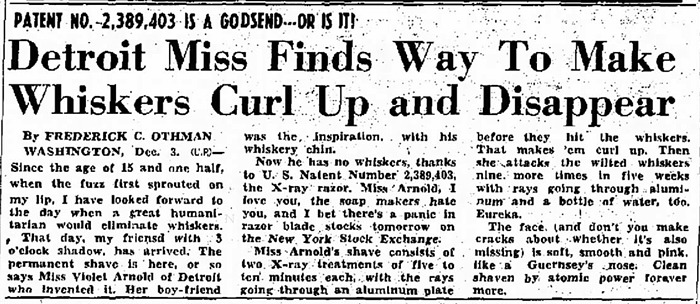
Amarillo Globe Times - Dec 3, 1945
The X-ray razor never caught on, probably because of the risk of serious, disfiguring burns. However, the idea lingered on in popular culture for a few years and was featured in several ad campaigns.

Crowley Post-Signal - Dec 12, 1952

Washington Court House Record-Herals - Jan 6, 1953
Posted By: Alex - Sun Dec 29, 2019 -
Comments (6)
Category: Inventions, Patents, Technology, 1940s
Novelty Watches
Posted By: Paul - Sat Dec 28, 2019 -
Comments (0)
Category: Fashion, Inventions, 1950s
Dishes cleaned by peeling
Someone obviously spent time to develop these peelable plates. So I wonder what advantage they saw in sticking the plates together, as opposed to just having a stack of cheap, paper plates?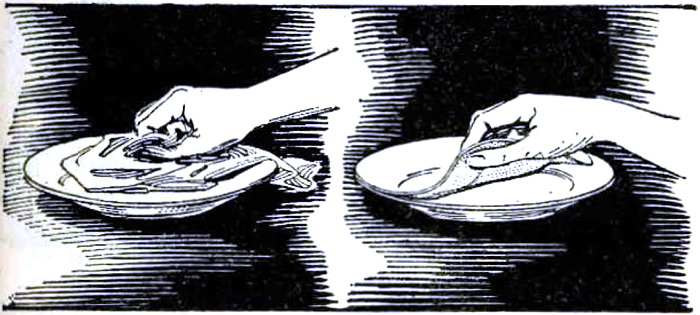

Posted By: Alex - Tue Dec 24, 2019 -
Comments (5)
Category: Inventions, 1920s
Fly-Operated Turtle
Patent No. 1,591,905, granted to Oscar C. Williams of San Diego, CA in 1926, described this curious device.It was a toy turtle. Its body was made of wood or aluminum, while the head, legs, and tail were made from lightweight cork. The user was supposed to insert several flies into the hollow body of the turtle. Their agitations once inside, as they sought to escape, would then cause the movable parts of the turtle to wag from side to side, as if the creature was alive.
I can see several drawbacks. First, you would have to catch some flies and maneuver them (alive) into the turtle. This was done by squeezing them through the leg hole. Handling a fly in this way seems like it could be a challenge.
And once in there, I imagine you'd have to wait until the flies died to get them back out. So, essentially, it was a fly torture device.
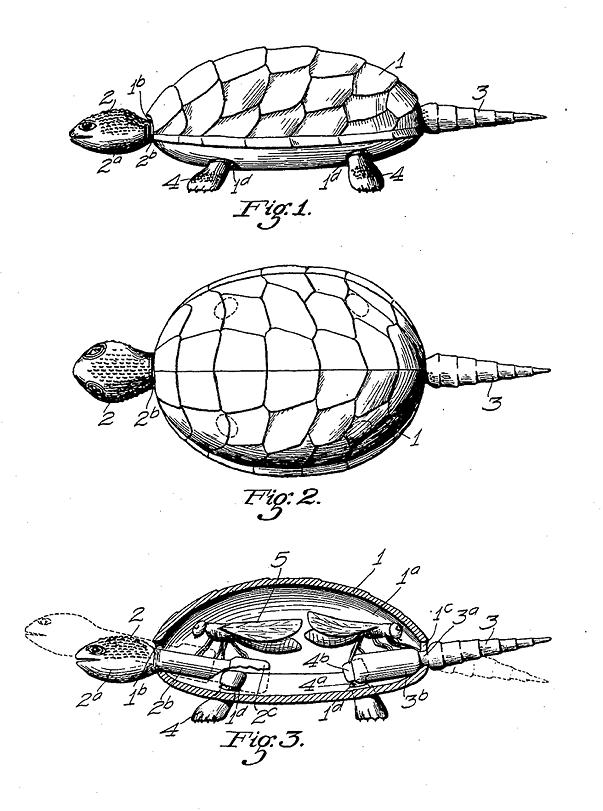
Posted By: Alex - Sun Dec 22, 2019 -
Comments (4)
Category: Insects and Spiders, Inventions, Patents, Toys, 1920s

| Who We Are |
|---|
| Alex Boese Alex is the creator and curator of the Museum of Hoaxes. He's also the author of various weird, non-fiction, science-themed books such as Elephants on Acid and Psychedelic Apes. Paul Di Filippo Paul has been paid to put weird ideas into fictional form for over thirty years, in his career as a noted science fiction writer. He has recently begun blogging on many curious topics with three fellow writers at The Inferior 4+1. Contact Us |




